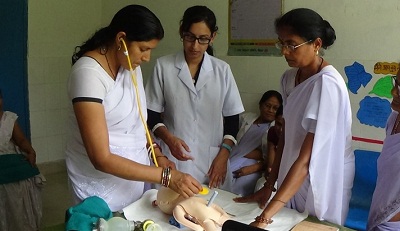HEALTH

The quality of healthcare in Bihar has never been in synch with the rest of the country, and this affects the most vulnerable section of the society the most. The national programs initiated by the government rarely benefit the segment of the society these programs are created for.
The birth of a baby girl in an ambulance is therefore not startling, because it is commonplace for women to give birth in rickshaws or a shared vehicle.
On 30th July, 2015, Mrs Sareeda Khatoon, a mother of 3 young boys reached a primary health centre in Muzaffarpur District. She was already in labor. Everything seemed normal until the umbilical cord came out. The nurses at the PHC (Primary Health Centre) were not equipped to handle such a situation and there was no doctor available to perform an emergency surgery. The only other option was to take Sareeda to the medical college, which was 40 km away. The situation had suddenly turned tense. However, CARE India’s efforts ensured that this baby’s birth was unlike others before her.
The events that followed were no short of the kind of emergency response such a patient would receive at a corporate hospital. This was made possible because of CARE India’s healthcare initiatives “AMANAT” (Aapaatkaaleen Matritva Evam Navjaat Tatparyata), an on-site training program for nurses, the program was still running in the district and two mentors for nurses happened to be present at the hospital. They strategized to prolong the delivery and arrange for the patient to be transferred to the medical college. They made sure that a nurse who was well equipped to handle the circumstances accompanied the patient.

Even after all these efforts, the baby was born 30 km away from the medical college. She was asphyxiated as she arrived into the world and she needed resuscitation. The ambulance was immediately diverted to a closer health facility to attend to the baby. The emergency response saved the baby’s life. All the essential drugs needed were already made available at this PHC by the time the ambulance reached, as this patient was tracked telephonically by the PHC.
Even though everything that could go wrong with Sareeda and her baby that day, did go wrong, the baby was still healthy and hearty. This was possible not only because this PHC boasts of all the required resources but also because the staff was well equipped to deal with some very complicated circumstances.
CARE India’s work in Bihar helps build skills and changing people’s perspective about their work through initiatives like AMANAT. This training program equips nurses to deal with unusual cases and situations to ensure better maternal and child health. It is heartening to witness how people are now willing to go that extra mile to save lives!




